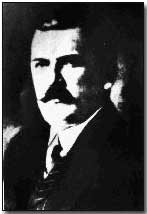Primary Documents - Chile's Reaction to Germany's Policy of Unrestricted Submarine Warfare, 7 February 1917
 Reproduced below is the text of
the diplomatic note sent by the Chilean government to its German counterpart
regarding Germany's newly reintroduced policy of unrestricted submarine warfare.
This policy in effect set in
place a blockade of Britain and her European allies, to be applied to
belligerent and neutral shipping alike.
Reproduced below is the text of
the diplomatic note sent by the Chilean government to its German counterpart
regarding Germany's newly reintroduced policy of unrestricted submarine warfare.
This policy in effect set in
place a blockade of Britain and her European allies, to be applied to
belligerent and neutral shipping alike.
The German government argued that such a policy was implemented only as an aggressive form of defence. It was announced in a letter from the German Ambassador to the U.S., Count Johann von Bernstorff, to the U.S. Secretary of State, Robert Lansing.
In the note the Bernstorff announced a re-opened German policy of unrestricted submarine warfare (initially introduced and then rapidly abandoned in 1916 owing to U.S. protests), to take effect the day following the date of the note (i.e. 1 February 1917). The German Chancellor Theobald von Bethmann-Hollweg spoke before the Reichstag on the same day to explain the reasons for the policy.
Reaction to the policy was rapid; the Allied powers inevitably decried its aggression, as did the U.S. government, which broke off diplomatic relations on 3 February 1917. On the same day President Woodrow Wilson appeared before Congress to announce his reasons, receiving virtually unanimous support in doing so.
Reaction among other neutrals was similarly one of dismay; click here to read Spain's reaction; click here to read Brazil's response.
Chile's Diplomatic Protest to Germany
7 February 1917
The Chilean Government has taken cognizance of the note sent to it by his Majesty the German Emperor, in which Chile is informed that Germany has fixed the limits of a blockade area around the coasts of England, France and Italy, and in the Eastern Mediterranean.
It has been informed also that within said limits Germany will resort to hostile acts against whatever ship is encountered, even if it belongs to a neutral power.
Such a measure, in the opinion of the Chilean Government, amounts to a restriction of the rights of neutrals, to which restriction Chile cannot agree because it is contrary to the principles that have been long established in favour of neutral nations.
The acceptance by Chile of the measures adopted by Germany would, moreover, divert her from the line of strict neutrality which has been followed during the European conflict.
Chile consequently reserves liberty of action to protect all of her rights in the event of any hostile acts against her ships.
Source: Source Records of the Great War, Vol. V, ed. Charles F. Horne, National Alumni 1923
A "listening post" was an advanced post, usually in no-man's land, where soldiers tried to find out information about the enemy.
- Did you know?
